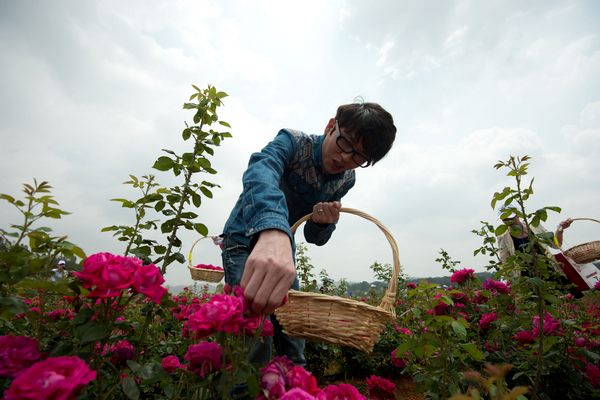Flower cakes catch tourists' attention in Yunnan
According to the Office of Yunnan Flowers and Plants Industry, the province currently has more than 12,000 mu of edible rose plantations in Kunming, Yuxi, Chuxiong, Lijiang, Qujin and Dali.
Wang Guiming, a 45-year-old farmer, has a rose plantation of about 2 mu in Yunzhaotun village, Bajie county in An'ning city. He has been cultivating roses for about a decade.
 |
|
A man picks flowers. Photo provided to China Daily. |
"In recent years, the price of edible rose has rocketed as demand increases. I make about 50,000 yuan a year. If we planted other crops, I'll probably be making about 3,000 yuan for every mu I plant. Almost every household in our village grows roses now."
The history of growing roses in Bajie county dates back to the 1970s, but the Bajie Cooperative of Edible Rose was founded in 2008 to strengthen the industry.
At present, the cooperative includes 197 members and has a total cultivated area of 1,000 mu. The cooperative also held research and develop new products, such as rose sugar, rose jam, rose lozenges, rose drinks, fresh juices, bath salts and even a rose liqueur.
"The price of roses has increased steadily, rising from about 8 to 9 yuan per kilo in 2008 to about 25 to 30 yuan per kilo in 2013," says Long Xinghuai, head of the Bajie cooperative.
It seems roses will continue to be in demand for a long time, since it seems to be the only flower that suits the purpose.
"We've tried to make the filling from other flowers such as sweet osmanthus and jasmine, but we failed. Only the rose can maintain its original fragrance after the cake is baked," Zhang of Jiahua says.
The Mid-Autumn Festival, Spring Festival and summer holidays are the best times for selling the pastries. It has also become a trend to buy the rose cakes as gifts, instead of traditional mooncakes.
The shelf life of flower cake varies from seven days to 45 days depending on the ingredients, and there are more than a dozen varieties of pastries on sale now. Some cakes have other ingredients added such as pine nuts and Yunnan's famous ham.
"Many food enterprises are venturing into this market because it is so promising. With more than 100 companies now jumping onto the bandwagon, it is still a scattered and disorganized industry. We are expecting the government to step in soon with some proper guidelines and regulations," Zhang says.





















